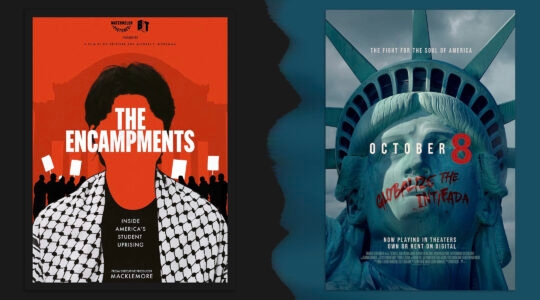God: (Genesis 22:2, as read on Rosh HaShanah) “Take your child, your only child, that you love so dearly, and offer him to Me as a sacrifice.”
Me: (in the voice of John McEnroe, 1981) “You cannot be serious!”
God: “Lest you doubt My intent, or My existence, I come to you Myself. (according to legend) … I, not an angel; I, not a Seraph; I, not a messenger; I am God!”
Me: “I don’t doubt Your existence. I believe in You; I worship You, but I’m still not sacrificing my child for You.”
God: “Do you understand what I can do to you, and your child, if you disobey Me?”
Me: “I do. Yet, You taught us if a town is held siege, and a single innocent individual is demanded for its liberation, the demand should be refused, even if the entire town be destroyed. Why is my child any less precious?”
God: “You dare to argue with Me?”
Me: “You’re right, I shouldn’t argue. I’m simply saying, I will not sacrifice my child, not for You, not for anyone or anything.”
At the climax of the perennial Broadway smash hit, the Pulitzer Prize-winning “South Pacific,” the hero embarks on a suicide mission behind Japanese lines because he has “nothing more to lose” since his fiancée, whom he has known for all of two weeks, has broken off their engagement. The audience applauds this noble sacrifice.
Why is no one bothered by the fact that he is the single parent of two grammar school children? “Nothing more to lose?” You’re condemning your children to grow up orphans because you’re upset over a 14-day romance? This is a hero?
At the climax of a yeshiva annual dinner, the honoree, the principal, explains to his six children, who are present, that the reason that they never see him is because he is taking care of hundreds of other children as if they were his own. The audience applauds this noble sacrifice.
If charity begins at home, doesn’t responsibility begin there, as well? The hundreds of other children have a father at home. Why do the principal’s children deserve any less? Why do we applaud this behavior?
At the climax of a tribute to Eliezer Ben Yehuda, the father of modern Hebrew, the speaker points out that Ben Yehuda and his wife so believed in their cause that they forced their son Itamar to speak Hebrew exclusively. The audience applauds this noble sacrifice.
The Ben Yehudas were, of course, ultimately successful. In 1898, a Hebrew speaking kindergarten opened in Rishon Le Tzion. By then, Itamar was 16, so it didn’t do him any good. In 1924, a Hebrew speaking university, the Technion, opened. Itamar was 42.
Was it truly heroic for the Ben Yehudas to raise their son in a language that no one spoke? How could he make friends if no one understood a word he said? Ben Yehuda deserves to be remembered for dedicating his life to a noble cause. Does he deserve to be honored for sacrificing his son’s life for that cause?
A familiar joke that Mel Brooks et al. have used is that, when faced with an insurmountable foe, rather than announcing defiantly:” Over my dead body!” we say to our companion:” Over your dead body!”
When anyone — the “South Pacific” hero, the yeshiva principal, Eliezer Ben Yehuda, and yes, even Abraham, our patriarch — knowingly agrees to sacrifice his or her child to a cause, no matter how noble, it is ignoble.
Torah commentators have suggested that God never intended for Abraham to sacrifice his son. They point out Isaac’s willingness to submit to his sacrifice. All well and good, but neither variable exculpates Abraham for putting the knife to his son’s throat.
Traditionally, we have venerated Abraham for prioritizing God over his own flesh and blood. Yet, it wasn’t his own flesh and blood that he was sacrificing; it was his son’s. He had that power; did he have that right?
When we choose to become parents, we accept the single greatest responsibility of our lives. We might have more than one child, but each of our children only has one mother and one father. No cause, no matter how noble, abrogates our responsibility to that child.
To paraphrase Hillel, if I don’t take care of my child, who will? If I don’t meet that responsibility, instinctual to all species, then what am I?
I recently delivered a eulogy for a 22-year-old man. In reality, he was a 22-year-old boy. He had sacrificed his life on the altar of a narcotic drug.
His brothers and father spoke wearing sunglasses. Their choking voices, and their uncontrollable tears, betrayed their grief nonetheless.
There were thousands of mourners in the sanctuary of the city’s largest synagogue. Every last one of them was there for the same reasons that I was, to pay and to pray. We wanted to pay our respects, but we needed to pray, to God, that we would never have to mourn the sacrifice of one of our own children.
The sacrifice of a child, by anyone, for any cause, is ungodly.
Isaac Steven Herschkopf is a psychiatrist and frequent contributor to these pages.
The New York Jewish Week brings you the stories behind the headlines, keeping you connected to Jewish life in New York. Help sustain the reporting you trust by donating today.




